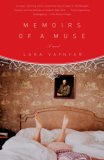Summary | Excerpt | Reviews | Beyond the Book | Readalikes | Genres & Themes | Author Bio

A Novel
by Lara Vapnyar
That scene about the governess I made up. I’m not sure that the sisters even had a governess. But I know that Apollinaria’s younger sister, Nadezhda, achieved great success: as the first Russian medicine woman, as an accomplished writer, as a political activist, as a wife. While Apollinaria . . . Apollinaria failed at just about everything she attempted. She failed as a scholar. She failed as a teacher. She failed as a writer. She failed as a wife. What else? Oh, yes, she failed as a lover; she failed as a lover several times.
Apollinaria Suslova didn’t succeed at anything, except immortality. But what good has immortality ever done anyone?
As a child, I used to think that Dostoevsky’s muse was his second wife, Anna Grigorievna. I knew her story before I knew anything else about Dostoevsky, before I’d read any of his books.
When I was three, my father left to marry a tall, square- shouldered woman named Marina; shortly after that, he died. To my mother and me it was a kind of double betrayal. Around that time, photographs of the major Russian writers began to line the wall in my mother’s room, replacing pictures of my father.
I never liked Tolstoy’s portrait—he looked like a mean Santa Claus, the one who won’t bring you anything good, the one who would leave a knitted scarf or a pair of socks under the tree. The existence of a mean Santa Claus was one of my early beliefs. There were two Santas, two brothers. The good one left glossy boxes with dolls, dolls’ furniture, or dolls’ dishes for me. The mean one left nothing but clothes—a huge waste. My mother would’ve bought me clothes anyway.
I didn’t like Chekhov’s portrait either. There was something suspicious about his grin and his pince-nez. What if he knew something that I didn’t want him or anybody else to know? What if he even knew about my aunt’s favorite vase, which I accidentally broke, disposing of the shards and then pretending not to know anything about it? I definitely didn’t like Chekhov!
Pushkin . . . well, Pushkin was okay. He seemed to be a nice guy, but he didn’t look serious enough for a writer.
Dostoevsky was the one whom I loved. He had strong hands and a large forehead, so large that it seemed to burst through his skin. He had serious eyes, and he looked straight at me, without hiding, without the fake playful expression of other adults. "Dostoevsky had different eyes," my mother said when she spotted me staring at him. "One brown and one black."
"Different eyes!" I repeated, awestruck, and asked if he had a wife. "He is dead" was the answer. "But he did have a wife, when he was alive. Her name was Anna Grigorievna."
I liked her name. "Was she nice?"
"Oh, yes, she was very nice. She took very good care of him."
"I could do that too!" I said.
I imagined Dostoevsky sharing a dinner table with my dolls. I knew how to prepare kasha for dolls and serve them tea. I would’ve spread a napkin on his lap and fed him my kasha, then I would’ve put him to bed, tucked his blanket around him and taken his temperature with my toy thermometer, just in case.
Dostoevsky stayed for me a dead writer with different eyes and a nice wife up until I turned ten and my grandmother got sick. Then I learned some more details about his life.
"Dostoevsky’s name was Fedor Mikhailovich, and so was your grandfather’s! Dostoevsky was crazy, but your grandfather even more so!" My grandmother told me this as I stood cutting her hair. I had no experience cutting hair, except for chopping up the coarse ringlets of my dolls’ curls.
My grandmother’s hair was white with a faint tint of yellow, light and slippery in my fingers. She’d always worn it in a neat chin-length cut with a thin blue band to keep the bangs from falling over her eyes. After the first few months she spent bedridden, her hair barely reached her shoulders, like feeble thawing icicles. She complained that long hair made her neck itchy, she complained that it made her hot, she complained that she looked like Robinson Crusoe. I said that she would need a beard to really look like Robinson Crusoe. I said that she’d better stop complaining. I said, "Enough, Ba." But she kept insisting on a haircut.
Excerpted from Memoirs of a Muse by Lara Vapnyar Copyright © 2006 by Lara Vapnyar. Excerpted by permission of Pantheon, a division of Random House, Inc. All rights reserved. No part of this excerpt may be reproduced or reprinted without permission in writing from the publisher.




Beliefs are what divide people. Doubt unites them
Click Here to find out who said this, as well as discovering other famous literary quotes!
Your guide toexceptional books
BookBrowse seeks out and recommends the best in contemporary fiction and nonfiction—books that not only engage and entertain but also deepen our understanding of ourselves and the world around us.